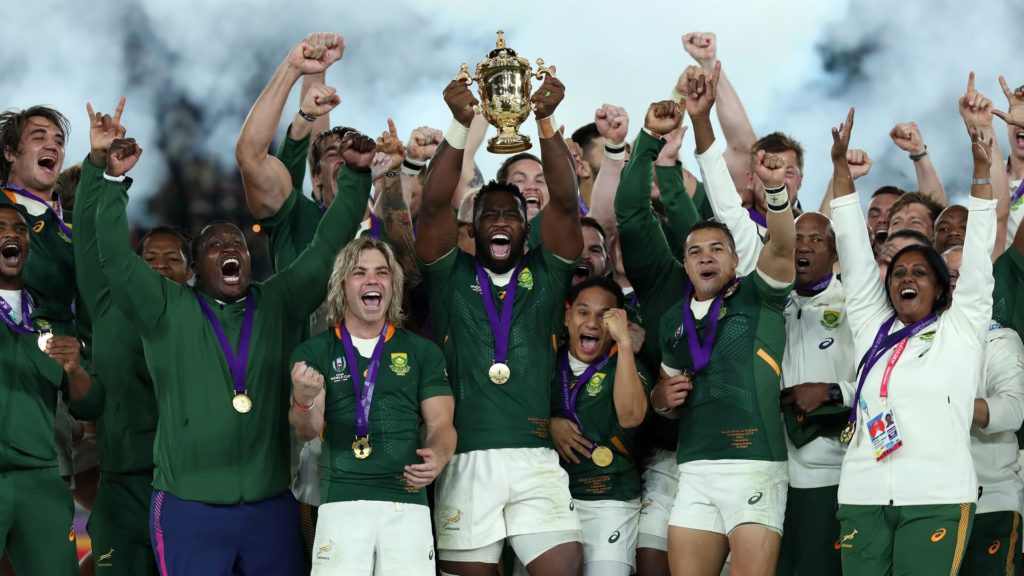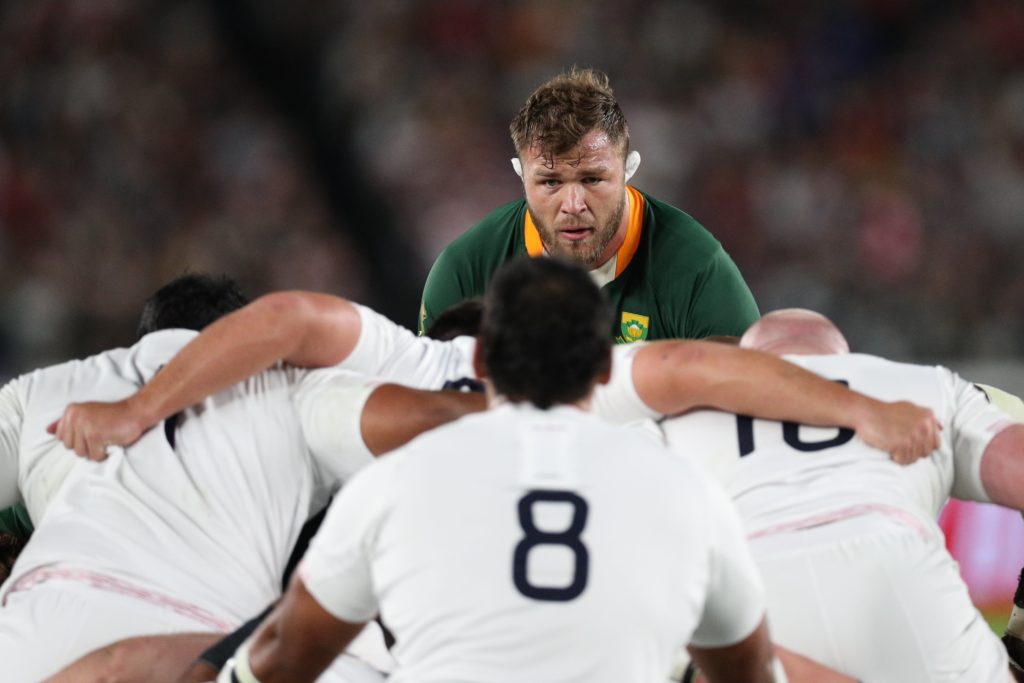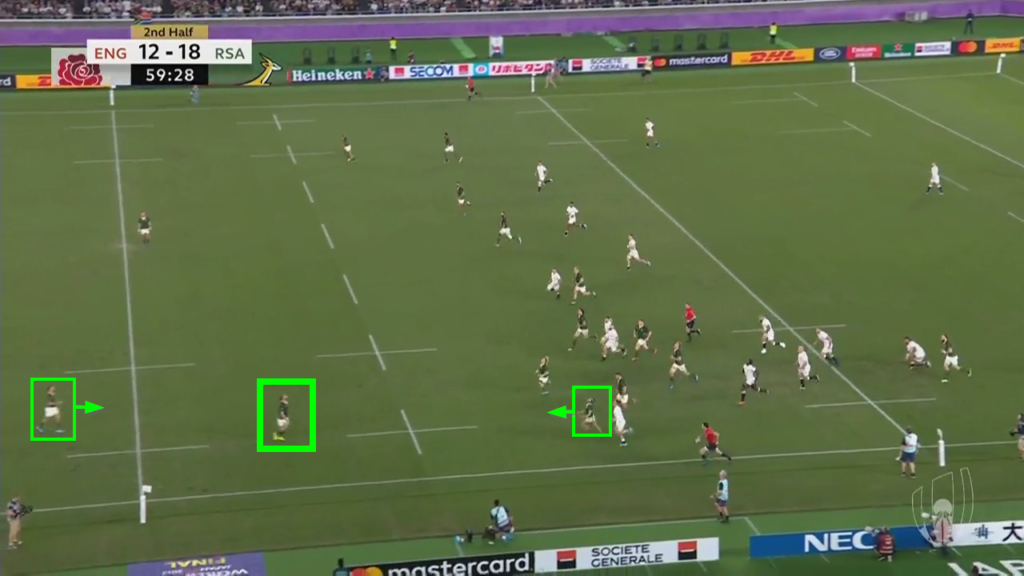What a difference a day makes. Or in this case, two big rugby occasions separated by 630 days, most of them dominated by the Covid-19 pandemic.
On Saturday 24 July 2021, South Africa lost the first test of their series against the British and Irish Lions in Cape Town. Their last serious game of rugby had been the World Cup final against England in Yokohama on 2 November 2019.
The Springboks won that match conclusively by 32 points to 12, on their ascent of rugby’s version of Mount Everest. In the long fallow interval which followed, they have been able to enjoy the fruits of victory unchallenged, especially after their withdrawal from the 2020 Rugby Championship. That left New Zealand, Australia and Argentina to play out a Tri-Nations on their own.
In retrospect, South Africa’s decision not to dip their toe back in the water in that tournament may be viewed as a mistake. It left the Springboks in a self-imposed quarantine, and without any international rugby for 21 months. Outside their long period of exile between 1982-1992, the last time South Africa spent as long self-isolating was back in the amateur era, in the two years between 1972 and 1974.

The drought then was also ended by a four-game tour from the British and Irish Lions, which the Lions won by three matches to nil, with the final test drawn. It was the first and only time that a Lions team has gone through an entire tour unbeaten.
Even when nothing appears to be happening on the surface, it does not mean that significant events are not occurring at a deeper level. The iceberg keeps moving, imperceptible to the naked eye.
Even though the main men of South African rugby, the SARU Director of Rugby Rassie Erasmus and Springboks head coach Jacques Nienaber, were able to select 17 of the 23 players who had represented South Africa in Yokohama, plus another two who had been in the World Cup squad (Kwagga Smith and Damian Willemse) versus the Lions in Cape Town, it was not quite the same as before. The thread of continuity had been lost along the way.
One of the minor fault-lines which proved to be much bigger than expected, was the absence of ‘the great Duane’ Vermeulen at number 8. Vermeulen was already 33 years old when he was hauled out of apparent international retirement by Erasmus for the World Cup. It proved to be an inspired master-stroke.
Vermeulen is now 35 and underwent surgery for an ankle injury in June. Unless your name happens to be Alun-Wyn Jones, it takes more time to shake off the knocks in your mid-thirties.
He is definitely in our plans, but it’s not a definite where I can tell you that it’s going so well that he’ll definitely be there. There is a good possibility, but we’re not banking on that at this stage.
Rassie Erasmus on Duan Vermeulen’s involvement in the Lions series
At the time, Erasmus commented:
“Duane is currently rehabbing with the Bulls, but he is touch and go either for the second or the last test match.
“I think the big question is match-fitness … you saw today with the intensity.
“If you have the right combinations next to him and the right substitutions, then maybe you can counter things like that.
“He is definitely in our plans, but it’s not a definite where I can tell you that it’s going so well that he’ll definitely be there. There is a good possibility, but we’re not banking on that at this stage.”

The Springboks’ brains-trust tried to replace Vermeulen with Leicester’s Jasper Wiese in the unofficial ‘fourth test’ between South Africa A and the Lions on 15 July, but switched to Kwagga Smith for Saturday’s match. Neither choice has proven satisfactory – but Wiese has again been given the journey for the second test.
The fault-line has widened into a yawning crevasse. Vermeulen was voted man-of-the-match in Yokohama. It is possible to illustrate just how much difference a player like Duane Vermeulen makes by reference to South Africa’s defence of the kicking game.
When the opponent is expected to use the box-kick to exit out of their own 22, the Springboks like to insert their number 8 as a receiver on the side-line, in between the backfield and the defensive line:

Vermeulen is typically positioned in between Cheslin Kolbe (running back from the line), and either number 10 Handré Pollard or fullback Willie Le Roux in the backfield. He was rock-solid in this role throughout the final match at the World Cup. England attempted seven contestable kicks in the game but only won back possession twice, for a meagre 28 per cent success rate.
Vermeulen made four receipts in the process, and that gave South Africa a platform to put the pressure back on the men in white:
In both instances, the Springboks are well-placed for the counter on the England 40-metre line. One phase after Vermeulen made the second catch, the first leak in the English defensive dam appeared:
By the middle of the second period, South Africa were so comfortable in defence of the high kick that they felt able to chance their arm on the return, ultimately scoring the second try of the match.
The score effectively put the result of the game beyond question. The Springboks high kick defence, marshalled by Duane Vermeulen, restricted one of the outstanding kick-chasers in world rugby (Johnny May on the England left wing) to only one reclaim in the match, while creating the game-winning try and one other line-break for South Africa.
With Kwagga Smith in for Vermeulen for the first test against the Lions in Cape Town, the situation was transformed. The Lions enjoyed a 53 per cent success rate from their 17 contestable kicks, and they devastated the Boks down (their) right side-line in the second half, when the reclaim rate surged to a massive 70 per cent.
The tone was set right at the beginning of the second period:
There is evident confusion between Kwagga Smith in the intermediate zone and Willie le Roux in the backfield. Tom Curry obliterates Smith in the tackle, and Duhan van der Merwe picks up a turnover penalty for no release by the Springbok number 8. The great Duane’s stronghold is no more:
It is rare to see a number 8 forward (and particularly a South African number 8) dominated in contact so conclusively by a wingman, and there is another big chance of turnover for Curry thereafter.
It went from bad to worse for poor Kwagga:
Van der Merwe wins first touch, and Lions number 6 Courtney Lawes is on hand to carry the ball deep into Springbok territory.
However South Africa tried to adjust, the defensive ‘code’ had already been cracked by the Lions’ kicking game:
Le Roux looks to come forward out of the backfield to protect Smith in this instance, but the result is the same. Van der Merwe again knocks over Kwagga in the contest for the loose ball, and the Lions pick it up in the South African half of the field.
Constant pressure applied in one area of the game tends to produce scoring ‘accidents’ over time:
There’s no Kwagga Smith under the high ball on this occasion, but the same weakness remains, and Duhan van der Merwe is able to escape down the left wing – only to be called back for a knock-on by Robbie Henshaw.
That was the story of the night for the Springboks – or at least the second half.
The period of quarantine in South African rugby life has had a tangible impact. Part of that self-isolation was self-imposed. The Springboks had a choice after all, whether to fulfil their part in the 2020 Rugby Championship.
Although Rassie Erasmus and Jacques Nienaber have been able to pick from largely the same group of players as at the 2019 World Cup, the results thus far have not been truly comparable. At the first test in Cape Town, the ‘bomb squad’ did not make the same impact off the bench – quite the opposite – and the South Africa’s big men, like Pieter-Steph du Toit, were outplayed by their opposites (Courtney Lawes) in plain sight.
The biggest miss for the Boks has been their grand-fatherly number 8, Duane Vermeulen. Vermeulen’s experience tied a lot of invisible strings together, and Nienaber has been unable to replace him satisfactorily with either Jasper Wiese, or the undersized Kwagga Smith.
With Vermeulen absent, an essential component of South Africa’s defence against the contestable kicking game was removed. Where England failed in the 2019 World Cup final, the British & Irish Lions succeeded in the first test at Cape Town.
Matters for South Africa have only looked the same on the surface in these fallow Covid years, and the ice at a greater depth has moved. It will be an uphill struggle for the Boks to win the final two matches against the Lions and claim a series win.


Comments
Join free and tell us what you really think!
Sign up for free